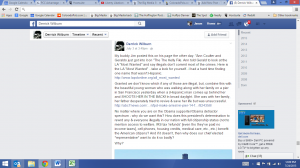Lynn Bartels leaves The Denver Post today, ending a 35-year run in journalism, with 22 of those years in Colorado. After starting her career in New Mexico, Bartels joined the Rocky in 1991 as its night cops reporter. In 2000, she started covering the state legislature. The Denver Post hired Bartels in 2009, immediately after the Rocky closed.
This week, Bartels answered some questions via email about the state of journalism in Colorado and her career as a reporter. (See other interviews in this series here.)
Why are you leaving The Post? Would you have stayed on if not for the economic troubles facing the newspaper and the pressure this puts on reporters?
Bartels: Certainly, I wouldn’t be leaving if a buyout hadn’t been offered. In fact, when I went to sign the paperwork, they asked where my package of stuff was, and I said I threw it away because I didn’t think I was going to take the buyout.
I always said, “I can’t leave newspapers. Who would hire me?” It turns out, I had some interesting opportunities. And that made me look at the industry and consider the buyout. I took the offer that made my family the happiest and where my new boss made me laugh during the interview ordeal. I thought, “I could really work for Wayne Williams.” Friends pointed out when I talked about that job I seemed happy. And it’s still politics and elections, which I love.
During the 1960s through mid-1980s, The Denver Post had 11 political reporters dedicated to covering elections and the legislature. In 2010, there were eight. Now that you’re leaving, there will be three, hopefully. No one would say political journalism here is dead, and the transformation of the news media has positive effects too, but what do you think Colorado is losing as The Post’s coverage of state politics shrinks? How bad is the situation? Or are you optimistic?
Quite frankly, the first blow was the loss of the Rocky. It covered politics in a different way. I wish now I had saved all the papers from 2008. We had Mike Littwin’s amazing stories from around the country and the state. M.E. Sprengelmeyer did a lessons learned from previous convention delegates. Burt Hubbard worked his data magic to do stories on how Colorado had voted over the years for president. I think Kevin Vaughan wrote the best lede in the country the night Barack Obama accepted the nomination at Invesco Field.
We had Roll Call and the Stump. When I did a list of things you might not know about Mark Udall, one item was that his youngest sister was an actress who had appeared in Law & Order.
When I arrived in Denver in 1993, both papers had political teams and legislative teams. It’s hard to imagine that now because it’s one and the same. Both papers had two reporters each covering Denver Mayor Wellington Webb and each paper had a full-time DIA reporter. The Rocky had three folks on education: higher ed, Denver Public Schools and suburban schools.
There was just lots more coverage of government.
Diminished resources aside, what are your biggest concerns about how political journalism is practiced in Colorado today? What do you admire most?
I think the coverage of education by Chalkbeat is outstanding.
I worry about the constant pressure to get things in first and fastest and there’s not the proper vetting.
What’s the worst error you made as a Colorado journalist? Can you name a story or two you’re most proud of?
I’ve made some doozies and actually would rather not go through the walk of shame again. The biggest mistake I’ve made overall in journalism, I believe, was too often letting my weight stand in the way of TV appearances. I turned most of them down just because I “felt fat.” Rocky editor John Temple basically had to force me to do the Denver mayoral debates in 2003. Yes, I went on Rachel Maddow twice but I turned her down more times than that. Ask Dominic Dezzutti at Colorado Public Television about my saying “no.”
I’ve had a front-row seat to some of the biggest stories in the state — the Oklahoma City bombing trials, Columbine — and along the way I’ve met some amazing people. Randy and Judy Brown, Rosemary and Wayne Wicks, the Flemings, I count them all as friends.
I loved it when former Rocky reporter Jeff Kass put on Facebook that most people now are talking about politics, my career was much more than that, including Columbine.
Favorite story? Maybe it was when a series of homeless men turned up dead, the Rocky assigned me to write about who these men were. I fought it (a common theme!) but in the end that might be one of my favorite stories. It turns out these people had friends and family, but for a variety of reasons, including addiction and mental illness, they just didn’t’ go home. I was working that Sunday when people called the Rocky about the piece. One woman was crying and said, “He hung outside our building and I never thought of him as a person until now.”
And I remember one night I had my coat on and I was getting ready to leave when I heard assistant city editor Luke Clarke say the pizza will be here in a few minutes. “Food! Free food! What’s going on?” I asked. The Denver Post today had depositions in the case involving the football recruiting scandal at CU, and we need to go through them. “Want some help?” I asked. And that was my life for the next five months. The Rocky won all kinds of awards for our reporting — yes, I have some sports-writing awards on my resume. The best ever was getting the investigative report a day early. We were all over national TV. I heard it was a very unhappy day at The Denver Post.
Colorado’s 2014 Senate race between Mark Udall and Cory Gardner was amazing, and I can never thank the Post enough for assigning me the race and letting me do my thing. I thank the Post for hiring me in the first place. Forever grateful.
I loved the story Tim Hoover and I wrote after the unbelievable civil unions blowup on the second to last night of the 2012 session. And then there was the front page “Has Hickenlooper lost his mojo?” piece that generated lots of e-mails and calls.
It would be so easy to leave the Post if I were miserable there, but I’m really happy right now with our team. That’s what makes leaving so hard.
What would you say to a young person considering a career in Journalism?
Find someone to teach you shorthand. Learn Spanish. Be as technologically advanced as you can be. Read. Read newspapers and not just online.
What will you miss most about your job at The Post?
I loved talking political intrigue with Editor Greg Moore. But I think what I will miss most of all was saying, “with The Denver Post.” That kind of says it all. People weren’t sure what the Rocky was. People in Colorado did. They loved it. Others? Well, they weren’t sure what it was. West Wing did a funny take on that once.
Other comments?
Here are some odds and ends.
In 2007, I won the Public Service Award from the Colorado Press Association for my stories on ethics issues at the Colorado Legislature. I think I was the first reporter in light years to win that award based on breaking news. There was no project editor, no graphics designer, no photographer assigned to the project, no one manipulating reams of data. It was old fashioned beat reporting and I was thrilled to see it honored.
I think former Post reporter Jessica Fender once summed me up better than most when she said something like, “Bartels will never be the kind of reporter who can go through stacks of documents and find the needle, but she’s the kind of reporter who people will pull aside and point her to this box of documents and say. ‘There’s a needle. Don’t tell anybody I told you.’”
Change has always frightened me. When I was first assigned to “the ledge” in 2000, I was miserable the first few weeks. There were many tears that Rocky editor Tonia Twichell and then Colorado Springs Gazette reporter Michele Ames had to deal with. And in 2014 I can remember crying in the women’s restroom in the Post, talking on the phone to Gardner spokesman Alex Siciliano and saying, “Why did they put me on this race? I don’t know federal issues. I don’t know about LMN.” And he said, “It’s LNG, liquified natural gas. I will walk you through it.” In both cases, I ended up loving the assignment.
In other words when you call me at Wayne’s World next month and ask how it’s going, I will say in a tiny voice, “It’s OK.” But later down the road, if you’re lucky, you’ll get to hear the famous Lynn Laugh, the one where interns used to ask, “Should we call 911?”



